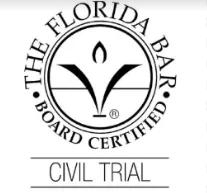
Navigating Workers’ Compensation for Remote Employees in Florida
Table of Contents
It goes without saying that a person can qualify for workers’ compensation if they have an accident on the job. But what happens if you get an injury while working from home or any other remote location?
While a remote workplace may seem like a perfectly safe and controlled environment, there are still many valid injuries that can happen if you are a remote employee. It is important to understand how to navigate a remote workers’ compensation claim so you can access the benefits owed to you no matter what happens.
How Does Workers’ Compensation Work in Florida?
Workers’ compensation provides medical benefits, lost wage compensation and vocational rehabilitation for employees who suffer an injury in the course of their work duties. Florida employers with four or more employees must provide workers’ compensation benefits to every person classified as an employee in the company. However, employers do not have an obligation to provide workers’ compensation to independent contractors.
When you suffer a work-related injury, you must report it to your employer within 30 days. Your employer will then process the claim with the company’s insurance provider. The insurance company will cover all of the medical expenses related to the injury, as well as most of your lost wages for the time you are unable to work due to the injury.
Workers’ compensation is a no-fault system. This means that you do not have to prove that someone else caused your injury. You can get compensation even if you caused the accident. However, you must be able to prove that the injury is work-related or that it happened during the course of fulfilling your job duties.
What Qualifies as a Work-Related Injury for Remote Employees?
Any injury that happens in the course of work-related duties or during work hours is eligible for workers’ compensation. If you work during scheduled hours as a remote employee, having an accident while you are “on the clock” will likely qualify you for compensation as long as it did not occur during a break period or personal time.
Common examples of work-related injuries for remote employees include:
- The onset of carpal tunnel syndrome from excessive keyboard use
- Other repetitive strain injuries such as tendonitis
- Slip and falls that happen at home during work hours
- Back pain or neck pain from poor office ergonomics
- Mental health injuries stemming from work-related stress
Having an accident during a scheduled break period will usually not qualify you for workers’ compensation. Benefits also do not apply if you get an injury while running a personal errand, even during work hours. Keeping thorough records of your work hours and break periods can help prove that your accident happened while you were on the clock.
Is It Difficult To File a Remote Workers’ Compensation Claim?
Filing a remote workers’ compensation claim can be difficult because there might not be much proof that the injury occurred during the course of work. If you are working from home, there will not likely be any impartial witnesses or supervisors who can back up your claim.
More difficulties can arise if you are working remotely from across state lines. Workers’ compensation is a federal requirement, but the exact processes and regulations can differ from state to state. Without an experienced workers’ compensation lawyer on your side, it can be overwhelming to try and navigate the complexity of this type of claim.
What Should You Do After a Remote Workplace Injury?
If you experience any type of injury during the course of your work, it is important to take it seriously. Even if you are working remotely, treat the situation the same way you would at any other job or workplace. You may qualify for significant workers’ compensation benefits beyond what you expect.
To protect your well-being and start a strong claim, you should take the following steps after a remote workplace injury:
- Seek immediate medical attention and get a copy of your medical records
- Report the injury to your employer in writing
- Document the accident with details of date, time, location and injury descriptions
- Take photographs of the injury and the workspace where it happened
- Get in touch with a workers’ compensation lawyer
In most circumstances, hiring a lawyer should not be necessary for a workers’ compensation claim. There is no need to prove fault or lack thereof, and thorough documentation should be enough to prove that your injury was work-related. Even so, it is a good idea to consult with an attorney early on in the process to ensure you have guidance if complications arise.
Contact Our Florida Workers’ Compensation Attorneys Today
Navigating a workers’ compensation claim can be stressful, especially if you are a remote worker. At Kogan & DiSalvo Personal Injury Law, we understand that you are feeling stressed and that you do not want to make any mistakes when filing your claim.
Contact us today to get a free case evaluation from our workers’ compensation attorneys. We can provide legal counsel every step of the way to help ensure you get the full benefits you deserve.
 (800) 707-9111
(800) 707-9111
 Call
Call

















